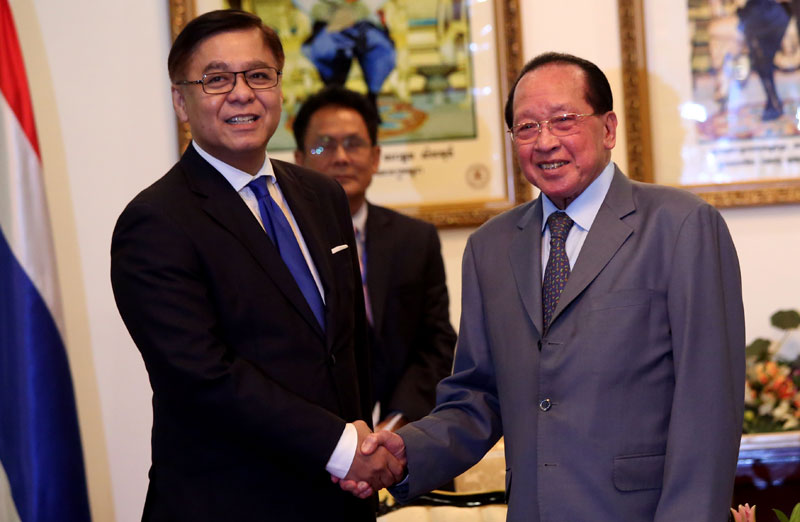Thai yellow-shirt activist Veera Somkwamkid, sentenced to eight years in prison on espionage charges in 2010, was freed by royal pardon Tuesday, following a request by General Prayuth Chan-ocha, head of Thailand’s military government, officials said.
The release came during a two-day visit by acting Thai Foreign Minister Sihasak Phuangketkeow, the first official visit by the junta since it sparked a mass exodus of more than 250,000 Cambodian workers, mostly illegal migrants, as a result of efforts to formalize the country’s labor force.

“Mr. Veera was released freely earlier today and he will go back home with the delegation tomorrow,” said Mr. Hun Sen’s personal assistant, Eang Sophalleth, following a meeting between the prime minister and Mr. Sihasak at Mr. Hun Sen’s office building, the Peace Palace.
The pardon of Mr. Veera, requested by Prime Minister Hun Sen, represents a change of heart for the government, which as recently as March rejected pleas from Thailand to free the ultranationalist activist. Ratree Pipattanapaiboon, who was sentenced along with Mr. Veera, was freed by royal pardon last year.
In his meeting with Mr. Sihasak on Tuesday, Mr. Hun Sen also appealed for the release of 14 Cambodians jailed earlier this month for carrying passports stamped with fraudulent work permits.
“During the meeting, the prime minister also asked for consideration to be given to the release of those 14 workers jailed after being deceived with fake documents,” Mr. Sophalleth said. “So far, since the meeting, there is no confirmation but the request has been made.”
Asked if Mr. Veera’s release was part of a prisoner swap, government spokesman Phay Siphan would only say the decision was made in the spirit of “compromise.”
Earlier in the day, Mr. Sihasak met with his Cambodian counterpart Hor Namhong at the Ministry of Foreign Affairs. The foreign ministers said they were committed to allowing Cambodian workers to return to Thailand legally.
“Cambodia has already asked Thailand to provide visas for more than 10,000 migrant workers and most of them have now returned to work there,” Mr. Namhong said.
Mr. Sihasak said that his government had fast-tracked the processing of work permits from three days to one, and established one-stop registration centers along the border to expedite the legal return of migrant workers to the country.
The Ministry of Labor issued a press release Tuesday, announcing modifications to its new scheme to facilitate the legalization process for migrants. Initially, more than 40 recruitment agencies were enlisted to provide a passport, all legal documentation, travel expenses and food during the journey at a set fee of $49.
But according to the statement, the cost to workers has been slashed by $14, with the agencies now consenting to front both the passport fee—$4, reduced last month from $124—and the $10 charge for certification from the Ministry of Labor.
“The companies have to pay the fees for workers: $4 to pay for the photo for passports, which will be paid to the Interior Ministry directly, and the fee for a certificate permitting migrants to work, which costs $10 and will be paid by the recruitment agency to High Solution Holding company,” the statement said.
An Bunhak, director of the Top Manpower recruitment agency, which is among the firms enlisted to help workers return to Thailand, said agencies would be largely unaffected by the change, as they would simply recoup the costs from employers in Thailand.
Explaining why the $10 fee for certification was now to be paid to High Solution Holding, Mr. Bunhak said the company had been approved to design and manage a new database monitoring system that would bring greater accountability to the process.
“This is a new initiative and the company, working with the General Department of Labor, has developed software and a database to build an infrastructure of monitoring and updating workers’ information,” he said.
High Solution Holding is not listed on the Ministry of Commerce’s online database. It could not be reached for comment.




